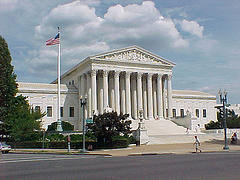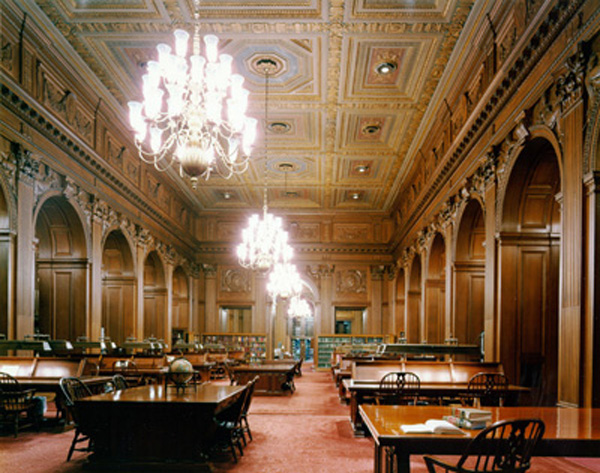Submissions for the third annual ABA in Law diorama contest are due by April 5. You can check out this year’s entries so far; entry instructions are available here. You could win up to $150 in Peeps, the perfect snack to power you through finals! OK, maybe Peeps aren’t the greatest brain food, but it would still be cool to win.
 Last Tuesday Judge Denny Chin refused to grant the plaintiffs’ motion for final approval of the Google Books Amended Settlement Agreement (“ASA”), finding that the ASA is not fair, adequate, or reasonable. The opinion is available here, and worth the quick read (students, you may be interested to see that Judge Chin uses several law review articles to provide background information about the case and its implications). Judge Chin, in analyzing whether the agreement met the requirements of Federal Rules of Civil Procedure 23(e), applied the factors articulated in City of Detroit v. Grinnell Corp., 495 F.2d 448 (2d Cir. 1974). He found that most of the Grinnell factors favored approval, i.e.:
Last Tuesday Judge Denny Chin refused to grant the plaintiffs’ motion for final approval of the Google Books Amended Settlement Agreement (“ASA”), finding that the ASA is not fair, adequate, or reasonable. The opinion is available here, and worth the quick read (students, you may be interested to see that Judge Chin uses several law review articles to provide background information about the case and its implications). Judge Chin, in analyzing whether the agreement met the requirements of Federal Rules of Civil Procedure 23(e), applied the factors articulated in City of Detroit v. Grinnell Corp., 495 F.2d 448 (2d Cir. 1974). He found that most of the Grinnell factors favored approval, i.e.:
- litigation has been complex, expensive, and lengthy
- the case has been pending since 2005
- the outcome of the case, were it to go to trial, is in substantial doubt
- maintaining the class throughout the litigation is risky
One factor however, weighed substantially against approving the settlement: the many negative reactions of class members, which Judge Chin summarized as follows:
- Adequacy of class notice. Judge Chin rejected this objection.
- Adequacy of class representation. Judge Chin found there to be an issue regarding the existence of competing interests between class members.
- Scope of relief under Rule 23. The judge found that the scope of the settlement goes beyond permissible bounds in several respects. First, the settlement reshapes copyright law related to orphan works and affects international copyright law, which are matters more properly determined by Congress. Second, the settlement goes far beyond the boundaries of the complaint, which was limited to the scanning and display of “snippets” by giving Google the ability to digitize and sell copies of millions of books, including books still protected by copyright. Third, the interests of some class members have not been adequately represented, such as academic authors who may prefer free access to their copyrighted books and the copyright holders to orphan works, who have a conflict of interest with Google. Fourth, the agreement violates copyright law by requiring copyright holders to take affirmative action to prevent the scanning of their books. Fifth, the settlement grants Google a monopoly over orphan books and increased Google’s position in the search market. Sixth, some objectors have concerns that consumers will lose privacy in their reading habits to Google, but Judge Chin rejected this concern due to Google’s safeguards. Seventh and lastly, despite the removal of certain foreign works from the ASA, foreign copyright holders continue to object that the settlement will affect their works and violate the international copyright law.
So what’s next? In closing, Judge Chin informed the parties that he may approve the settlement if it were changed to an “opt-in” agreement from an “opt-out” agreement. This option is extremely unattractive to Google because it significantly decreases Google’s ability to exploit the books it has digitized so far.
So what is next? A status conference is scheduled for April 25. Google has not yet publicly responded to the court’s decision. Settlement does not seem very likely. An “opt-in” settlement agreement accomplishes very little for Google because Google can, and already has, continue to make private agreements with publishers and authors. Many of us hope that Google will approach Congress to pass copyright reform, such as this legislation that stalled out in Congress in 2008.
While Congress is the appropriate forum for addressing the issue–and not a far-reaching agreement between corporations and private parties–Congress is notorious for leaving the crafting of copyright legislation to large, wealthy, corporate copyright holders. The voices of libraries, the public, and people who make use of public domain materials, are typically ignored. So although I have been hoping for the settlement to be rejected so that Congress can tackle the problem, there are some serious barriers to its passing. Google will propose legislation very similar to the ASA, except the Registry will be government run and the ability to exploit orphan works will be opened up to other entities. Companies like Amazon and Microsoft will not like this because Google has a head start on commercializing orphan works. Congress will ignore provisions meant to assist libraries in digitizing their collections or helping patrons gain access to orphan and out-of-print works. Is there any way to make arguments in support of a robust public domain palatable to Congress?
 Congratulations to Luwam Dirar, Cornell JSD student, who recently published the research guide for Eritrea she co-authored with Kibrom Tesfagabir. The guide, entitled Introduction to Eritrean Legal System and Research, includes the following sections:
Congratulations to Luwam Dirar, Cornell JSD student, who recently published the research guide for Eritrea she co-authored with Kibrom Tesfagabir. The guide, entitled Introduction to Eritrean Legal System and Research, includes the following sections:
- Constitutionalism
- Government (National Assembly, Executive, Judiciary)
- Court structure (regular courts, military courts, Sharia courts, etc.)
- Legal education
- Resources for researchers
The guide is published by Globalex, an online collection of research tools for foreign and international law hosted by the Hauser Global Law School Program at NYU Law. Globalex publishes research guides for many countries, and these are a great, free place to help familiarize yourself with that country’s legal system and legal publications, including Web sites. The foreign law guides are generally written by lawyers who have studied and practiced in these countries. Globalex also publishes research guides about international law and comparative law.
 When members of the legal community think about legal scholarship, what typically comes to mind is the concept of a print law journal (e.g., the Cornell Law Review, the Cornell Journal of Law & Public Policy, the Cornell International Law Journal, etc.). These works undoubtedly serve a very important function, but I wanted to write a bit about another relevant legal journal sited at Cornell Law School: the LII Supreme Court Bulletin. I am fairly familiar with this Web site, having served as an LII editor during the 2009-10 academic year (my now-outdated biography is viewable here). The LII Supreme Court Bulletin (“Liibulletin”) contains previews of cases on the Supreme Court’s (“SCOTUS”) docket. Because the previews are written with recourse to the relevant parties’ submitted briefs (the full versions of which are usually available here) and are published before the decisions are handed down, the previews generally reflect a balanced view of the legal issues unaffected by the bias of hindsight.
When members of the legal community think about legal scholarship, what typically comes to mind is the concept of a print law journal (e.g., the Cornell Law Review, the Cornell Journal of Law & Public Policy, the Cornell International Law Journal, etc.). These works undoubtedly serve a very important function, but I wanted to write a bit about another relevant legal journal sited at Cornell Law School: the LII Supreme Court Bulletin. I am fairly familiar with this Web site, having served as an LII editor during the 2009-10 academic year (my now-outdated biography is viewable here). The LII Supreme Court Bulletin (“Liibulletin”) contains previews of cases on the Supreme Court’s (“SCOTUS”) docket. Because the previews are written with recourse to the relevant parties’ submitted briefs (the full versions of which are usually available here) and are published before the decisions are handed down, the previews generally reflect a balanced view of the legal issues unaffected by the bias of hindsight.
Liibulletin is a fantastic resource for people who are interested in keeping abreast of SCOTUS cases, but don’t have tons of free time to do so (e.g., law students who have more than enough assigned reading for courses). But one of the really neat things about LII bulletin is that it is particularly comprehensible and may be utilized by people without legal educations or backgrounds. In order to ensure that LII previews remain accessible to lay persons, all the previews contain hyperlinks to a free legal dictionary and encyclopedia called Wex. You will also note, by the way, that this dictionary, although frequently embedded within Liibulletin, is its own free-standing resource.
Each preview contains the following sections:
(1) A few key subject areas and descriptive terms. These lists of terms are useful since anyone can perform a subject-matter search in Liibulletin across SCOTUS terms.
(2) An executive summary. This section, which is emailed to all Liibulletin subscribers, succinctly identifies the relevant facts, issues, and arguments of the case. It also generally addresses the legal (and, if relevant, nonlegal) significance(s) of the case.
(3) Itemized questions presented. These are copied verbatim as provided on the Supreme Court’s case schedule.
(4) Itemized issues. As I mentioned earlier, Liibulletin is published with the underlying goal of making the law accessible to the public. In this way, this section can be thought of as a simplification of the questions presented section.
(5) Factual narrative. Predictably, this section tells a balanced story of the case and discusses facts pertinent to the controversy before the Court.
(6) Discussion. This is the section that focuses on the greater picture. It calls into question the consequences of the case from largely a policy perspective. This section more or less explains the importance of the case.
(7) Analysis. The analysis section is a detailed and balanced analysis and explanation of the legal issues before the Court. It typically goes beyond summarizing the parties’ briefs and actually synthesizes the lower courts’ opinions and the briefs submitted by amici curiae.
(8) Conclusion. The conclusion essentially restates the executive summary by tying everything together. Once in a while, LII editors will include their own opinions about how the Court should rule.
(9) Additional Sources. Each preview concludes with a list of additional legal sources that discuss the case.
I absolutely encourage anyone (or better yet, everyone) with an interest in learning about the Supreme Court’s docket to peruse the previews. If you’d like to have the previews sent directly to your email address, you can subscribe to Liibulletin here.
Daniel Shatz, Cornell Law School 3L Student
Photo courtesy of dbking’s Flickr stream.
 Still looking to do something rewarding in Washington, D.C. this summer? The U.S. Supreme Court has two openings for volunteer internships of up to twelve weeks specifically for law students. One of the openings is in the Supreme Court Library and requires some library work experience or progress on a library science degree. The other internship is in the Office of the Reporter of Decisions and is open to a law student who has editing experience. Details are available here.
Still looking to do something rewarding in Washington, D.C. this summer? The U.S. Supreme Court has two openings for volunteer internships of up to twelve weeks specifically for law students. One of the openings is in the Supreme Court Library and requires some library work experience or progress on a library science degree. The other internship is in the Office of the Reporter of Decisions and is open to a law student who has editing experience. Details are available here.
Hurry! Applications must be turned in by Tuesday, March 22.
 March is Women’s History Month. An overview of the legal origin of this celebration is available from the Law Library of Congress. Here, copies of the 19th Amendment, relevant Congressional Resolutions and Presidential Proclamations, and some recent public laws, are available for viewing. The 2011 Presidential Proclamation is available from the White House here. Other good sources of information include the National Women’s History Project and www.womenshistorymonth.gov, where the Library of Congress, National Archives and Records Administration, National Endowment for the Humanities, National Gallery of Art, National Park Service, Smithsonian Institution and United States Holocaust Memorial Museum “join in paying tribute to the generations of women whose commitment to nature and the planet have proved invaluable to society.”
March is Women’s History Month. An overview of the legal origin of this celebration is available from the Law Library of Congress. Here, copies of the 19th Amendment, relevant Congressional Resolutions and Presidential Proclamations, and some recent public laws, are available for viewing. The 2011 Presidential Proclamation is available from the White House here. Other good sources of information include the National Women’s History Project and www.womenshistorymonth.gov, where the Library of Congress, National Archives and Records Administration, National Endowment for the Humanities, National Gallery of Art, National Park Service, Smithsonian Institution and United States Holocaust Memorial Museum “join in paying tribute to the generations of women whose commitment to nature and the planet have proved invaluable to society.”
Several databases are available through the Cornell University Library that focus on women’s issues (IP authentication required), including Genderwatch (“In-depth coverage of the subjects that are uniquely central to women’s lives, including family, childbirth, birth control, daycare, domestic abuse, work and the workplace, sexual harassment, aging, aging parents, body image, eating disorders and social and societal roles.”); Studies on Women and Gender Abstracts (“Indexes books and journal articles on education, employment, women in the family, medicine and health, gender role socialization, social policy, the social psychology of women, female culture, media treatment of women, biography, literary criticism and historical studies.”); and Women’s Studies International (“Provides citations and some abstracts to the core areas of Women’s studies.”)
Image from the Library of Congress’ Flickr stream.
Congratulations to the winners of our prize drawings from the Cornell Law Library’s student survey! 2L Joseph Pohlkamp is the winner of the reserved study carrel for Fall semester 2011, and 3L Lilian Balasanian won the $25 Cornell Store gift card.
Thank you to everyone who took the time to participate in the survey. Your feedback helps us make the library even better. We will share the results of the survey with you soon.
 The webinars on HeinOnline Searching have been rescheduled for this week on Thursday, March 3, at 10am & 2pm.
The webinars on HeinOnline Searching have been rescheduled for this week on Thursday, March 3, at 10am & 2pm.
It’s not too late; you can still register for one of these sessions:
- Sign up for 10am at https://www2.gotomeeting.com/register/122053890
- Sign up for 2pm at https://www2.gotomeeting.com/register/619093115
For more information about the webinar, click here.




